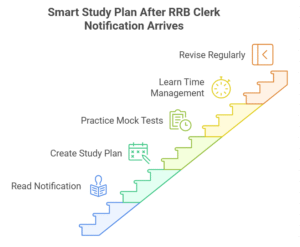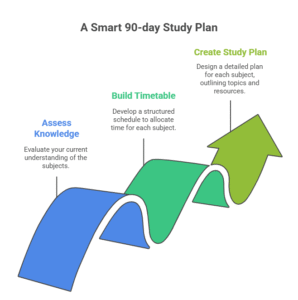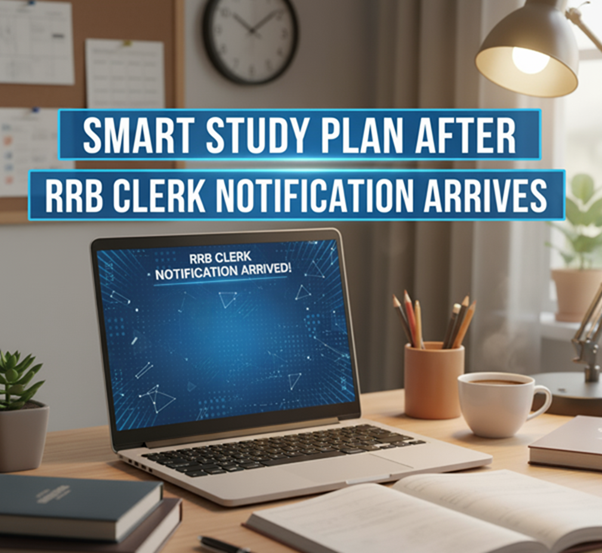IBPS has officially released the RRB Clerk notification on 31 August 2025; the clock is ticking for all the aspirants aiming to build their career in RRBs.
The RRB PO prelims exam dates are 6th, 7th, 13th, and 14th December 2025. So, roughly, you have around 90 days to prepare for the IBPS RRB 2025 exam. With such a limited time, you need a smart strategy to cover the vast syllabus of the RRB Clerk exam.
Don’t worry! In this article, I’ll share crucial insights into the IBPS RRB Clerk preparation strategy, which includes a subject-wise study plan and practical tips to maximize your efficiency.

1. Read the IBPS RRB Clerk Notification
Before you start your preparation for the RRB Clerk exam, you should first read the RRB Clerk notification. It will help you understand the IBPS RRB exam inside out, such as eligibility, pattern, syllabus, and more.
- Eligibility Criteria: Minimum 18 and maximum 28
- Pattern: 2 Stage selection process
- Prelims: 2 subjects (Quant and Reasoning)
- Mains: 5 subjects (Quant, Reasoning, English/Hindi, Computer, and GA)
Please note that Prelims is qualifying in nature; your selection will be decided by the marks you’ll score in your Mains exam.
2. Create a Smart 90-day Study Plan
Below, I have outlined a subject-wise smart RRB Clerk study plan, enabling you to cover the syllabus within 90 days.

Step 1: Access Your Current Knowledge Level
In order to know where you currently stand, attempt a mock test or the latest previous year’s question paper. Now, analyze your performance to identify your strengths and weaknesses.
Based on the analysis, categorize the RRB Clerk topics into strong and weak. Now, you need to improve your weak subjects while maintaining a strong hold on your strong subjects.
Step 2: Build a Practical Timetable
Do not copy someone’s RRB Clerk study plan; you need to create your own study plan based on your strengths and weaknesses. Here is a sample plan that you can take inspiration from (not to copy exactly)
Example Daily Schedule (6–8 hours for full-time aspirants):
- Quantitative Aptitude: 1.5 hours
- Reasoning Ability: 1.5 hours
- English/Hindi Language: 1 hour
- Computer Awareness: 1 hour
- General/Finance Awareness: 2 Hours
Keep 30 minutes for daily revision.
Step 3: Create a Subject-Wise Study Plan
Here is the sample study plan for each RRB Clerk subject:
- Quantitative Aptitude
- Cover high-weightage quant topics first, such as DI.
- Later focus on arithmetic topics: Simplification, Approximation, Number Series, DI, Ratio, Profit & Loss, Simple & Compound Interest, Time & Work, Speed & Distance.
- Practice the sectional mock test after covering each topic.
2. Reasoning Ability
- Similar to quant, focus on high-weightage reasoning topics, such as Puzzles and Seating Arrangements.
- Later move on to cover other topics as machine input-output, syllogism, blood relation, direction, etc.
- Practice daily puzzles and seating arrangements with increasing difficulty.
- Work on managing speed with accuracy.
3.General Awareness
To cover GA, you need to focus on the following:
- Current Affairs (at least past 4 to 6 months)
- Latest Banking & Financial Awareness
- Recent Reports
- Government Schemes
Do not ignore the Static GK, including important national parks, dams, currencies, and capitals.
4. English/Hindi Language
You need to choose 1 subject as your language:
- If you choose English, you should focus on grammar, RC, Sentence Correction, Para Jumbles, Fill in the Blanks, and Error Detection.
- If you choose Hindi, you should focus on basic Hindi Grammar rules, comprehension passages, vocabulary, and sentence rearrangement.
5. Computer Knowledge
Computer knowledge is one of the easiest subjects of the RRB Clerk exam. Here, you need to focus while covering this subject:
- Cover the basics of computer terminology
- MS Office, Internet, Networking, and Security Tools.
- Check PYQs and cover the common questions from hardware, software, shortcuts, and basic troubleshooting.
3. Practice Multiple Mock Tests
Mock tests are crucial to understand the knowledge gaps. Here is how you should attempt mock tests:
- Attempt 2–3 full-length mock tests every week.
- Thoroughly analyze your performance
- Identify your weak areas
- Note down your common mistakes.
Learn from your previous mistakes and make sure not to repeat them.
4. Learn Time Management
Follow these tips to understand how to manage your time efficiently:
- Set small achievable goals
- Take small breaks between long study sessions
- Don’t focus on only 1 subject a day, mix multiple subjects
- Take time to analyse your mistakes
5. Revise Regularly
Here is how you should revise for the RRB Clerk exam:
- Daily revision helps you improve your retention power.
- Make small notes for formulas, facts, and short tricks.
- Keep weekends to revise what you have learned in the entire week.
What Next
Now that you know what to do while preparing for the RRB Clerk exam in such a limited time, start your preparation ASAP. Remember not to make the following mistakes:
- Avoiding Mains subjects and focus only on Prelims
- Choosing multiple resources and getting overwhelmed
- Not practicing mock tests
- Ignoring regular revision





